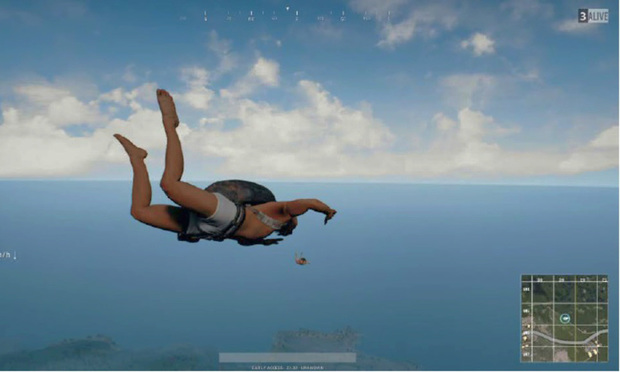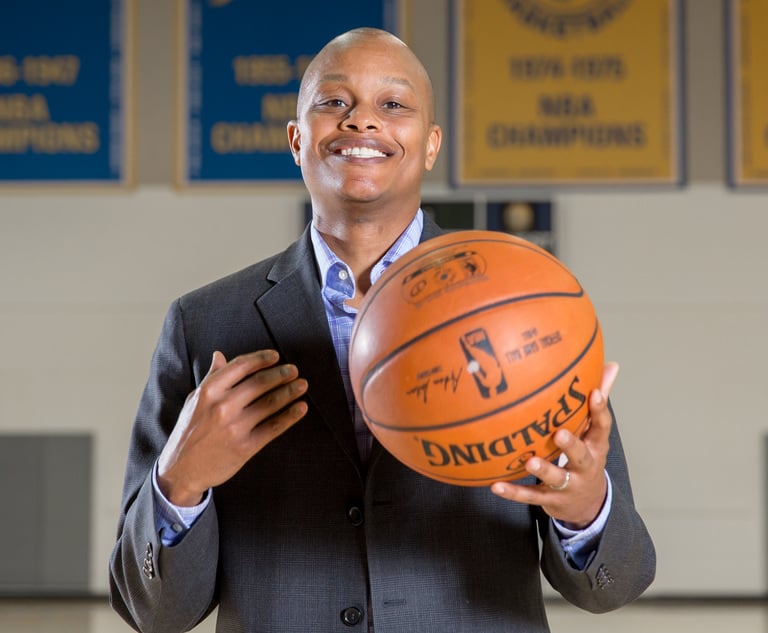Video Game Companies in Copyright Battle Royale
Sidley and Quinn Emanuel square off in a high-stakes fight that could make new law on the look and feel of games.
September 24, 2018 at 06:46 PM
7 minute read
 Screenshot from the video game “Battlegrounds.”
Screenshot from the video game “Battlegrounds.”Big-name partners are breaking out metaphorical guns and frying pans as they wage a copyright battle over the look and feel of one of the world's most popular video games.
Sidley Austin partner Steven Baik and Quinn Emanuel Urquhart & Sullivan partner Claude Stern are scheduled to appear Friday before U.S. District Judge Jeffrey White of Oakland in a high-stakes case over blockbuster games inspired by the novel and movie “Battle Royale.”
The maker of “PlayerUnknown's Battlegrounds” complains that “ Rules of Survival” has copied weapons, vehicles, landscapes and what it describes as an iconic frying pan that can be used as a weapon or body armor. “ Rules of Survival” accuses “Battlegrounds” of trying to copyright ideas and “monopolize the popular 'battle royale' genre of video games.”
Lawyers who focus on the video game industry are watching closely. It's not that video game “cloning” disputes are new. “We've seen cloning cases before,” says Fenwick & West associate Nicholas Plassaras, who works with gaming clients and presented last month at Gamescon Congress in Germany.
But most cloning disputes involve mobile games, where both the financial stakes and the quality of the gaming are lower, Plassaras says. “Battlegrounds,” also known as “PUBG,” and “Rules of Survival” are Triple-A titles painstakingly developed for PCs and consoles at high cost, and have likely generated hundreds of millions of dollars in revenue, if not a billion.
PUBG v. NetEase therefore presents a new suite of copyright issues, such as whether the detailed rendering of a real-world product such as an assault rifle is copyrightable. “That is not a straightforward issue,” Plassaras says. “It'll be very interesting to see if the court touches on it.”
Depending on how the case comes out—and there are good arguments on both sides, Plassaras says—it could help set a tone across the industry for what is acceptable copying and what isn't.
It took only a year for “PlayerUnknown's Battlegrounds” to become one of the most popular video games of all-time. Brendan Greene, widely known by his screen name, PlayerUnknown, supervised a team of 70 developers for Korea-based PUBG Corp. to realize his vision of the game.
Up to 100 players at a time parachute onto an island and start scavenging for weapons, vehicles and clothing. As the game's map size shrinks, players are forced to confront each other and kill or be killed. The last player standing is rewarded with a whimsical salute: “Winner Winner Chicken Dinner!”
“ Battlegrounds” sold 28 million copies of the PC version within a year of its March 2017 beta release, plus another 4 million for Xbox. At one point last December, a record 3 million people were playing the game concurrently on Steam, according to PUBG Corp.
The success of “Battlegrounds” didn't go unnoticed. Last fall, China-based NetEase Inc. released it's own game, “Rules of Survival.” As with “Battlegrounds,” “Rules of Survival” players can socialize together in an online waiting room before parachuting onto a similar-looking island. Players fire similarly authentic-looking assault weapons, wear similar helmets and even wield frying pans. And the winner is greeted with the same cheer: “Winner Winner Chicken Dinner!”
PUBG, which is a subsidiary of Bluehole Ginno Games Inc., also sued the makers of the “Fortnight” video game in South Korea last January, but withdrew the suit in June without public explanation.
In the NetEase case, PUBG and its Sidley Austin attorneys allege that “Rules of Survival” has copied “Battlegrounds”'s entire look and feel, and some 22 different creative flourishes. One example is each individual player's ability to choose when to jump from the aircraft and parachute onto the island. That provides “a dynamic and interactive game-starting and location-selecting experience,” unlike other shooter games where characters “spawn in pre-determined or random locations,” Baik writes in the complaint.
Players then scavenge for weapons—rifles, shotguns, machetes, grenades, frying pans and more. Each weapon features realistic action, such as recoil, and sounds. “PUBG created a realistic combat environment, including realistic weapons,” Baik writes. But, he adds, “each weapon has been stylized to make it distinct from actual real life weapons.”
The frying pan armor, he notes, has inspired “Battlegrounds” parodies and memes, underscoring its distinctiveness. “Previous shooter games did not include the use of a frying pan,” Baik writes.
When “Rules of Survival” and another NetEase title, “Knives Out,” were launched, some industry commentators described them as “Battlegrounds” knockoffs. VG24/7 “described a UI that's nearly identical to Battlegrounds” and various other features. “The idea wasn't that these features were lifted, it's that everything else also was,” reviewer Sherif Saed wrote.
But as Fenwick's Plassaras notes, “copying in and of itself is not necessarily illegal. There's nothing that stops you from copying the same idea behind a game.”
That's the primary argument Stern makes for China-based NetEase, maker of “Rules of Survival.” PUBG can't copyright the “ideas, rules or expression that flows from the game itself,” Quinn Emanuel's Stern writes in a motion to dismiss. He quotes the U.S. Copyright Office: “Once a game has been made public, nothing in the copyright law prevents others from developing another game based on similar principles.”
Stern argues that the court must “filter out” all unprotectable expression, such as weapons and vehicles that were copied from real-world products, or that are inherent in a game of survival.
Stern points to Capcom v. MKR, a 2008 decision of U.S. District Judge Richard Seeborg that dismissed a copyright complaint by owners of the movie “Dawn of the Dead” over the video game “Dead Rising.” Both works depicted similar-looking characters trying to survive a zombie outbreak in rural, two-story malls.
“These multiple extensive similarities were 'filtered out' because they flow from 'the wholly unprotectable [idea] of humans battling zombies in a mall during a zombie outbreak,” Stern writes.
Meanwhile, Stern contends that patent drawings confirm PUBG is asserting copyrights on unprotectable, real-world guns, weapons, and equipment. “After filtering out that which PUBG has taken from many other creators, so little expression is left that only wholesale, identical replication of Battlegrounds could infringe PUBG's copyright.”
Finally, Stern notes that short phrases, “no matter how distinctively arranged,” are not subject to copyright. “The short phrase 'Winner winner chicken dinner' is therefore unprotectable,” Stern concludes.
Could the case really come down to “Winner Winner Chicken Dinner”? Baik argues that while short phrases may not be independently copyrightable, NetEase's copying of the phrase “is relevant to the infringement analysis, as it clearly reflects that defendants were copying Battlegrounds.”
“It's an interesting question. It really is,” says Fenwick's Plassaras. “'Winner Winner Chicken Dinner' is something the PUBG game is very well-known for.” NetEase is right that copyright doesn't protect short phrases, but PUBG's argument about evidence of copying has “rhetorical force,” Plassaras said.
If the case goes all the way to a decision on the merits, he says, “it's going to be interesting to see the courts grapple with these issues.”
This content has been archived. It is available through our partners, LexisNexis® and Bloomberg Law.
To view this content, please continue to their sites.
Not a Lexis Subscriber?
Subscribe Now
Not a Bloomberg Law Subscriber?
Subscribe Now
NOT FOR REPRINT
© 2025 ALM Global, LLC, All Rights Reserved. Request academic re-use from www.copyright.com. All other uses, submit a request to [email protected]. For more information visit Asset & Logo Licensing.
You Might Like
View All
On The Move: Squire Patton Boggs, Akerman Among Four Firms Adding Atlanta Partners
7 minute read

Judge Grills DOJ on Trump’s Birthright Citizenship Executive Order

NBA Players Association Finds Its New GC in Warriors Front Office
Trending Stories
- 1States Accuse Trump of Thwarting Court's Funding Restoration Order
- 2Microsoft Becomes Latest Tech Company to Face Claims of Stealing Marketing Commissions From Influencers
- 3Coral Gables Attorney Busted for Stalking Lawyer
- 4Trump's DOJ Delays Releasing Jan. 6 FBI Agents List Under Consent Order
- 5Securities Report Says That 2024 Settlements Passed a Total of $5.2B
Who Got The Work
J. Brugh Lower of Gibbons has entered an appearance for industrial equipment supplier Devco Corporation in a pending trademark infringement lawsuit. The suit, accusing the defendant of selling knock-off Graco products, was filed Dec. 18 in New Jersey District Court by Rivkin Radler on behalf of Graco Inc. and Graco Minnesota. The case, assigned to U.S. District Judge Zahid N. Quraishi, is 3:24-cv-11294, Graco Inc. et al v. Devco Corporation.
Who Got The Work
Rebecca Maller-Stein and Kent A. Yalowitz of Arnold & Porter Kaye Scholer have entered their appearances for Hanaco Venture Capital and its executives, Lior Prosor and David Frankel, in a pending securities lawsuit. The action, filed on Dec. 24 in New York Southern District Court by Zell, Aron & Co. on behalf of Goldeneye Advisors, accuses the defendants of negligently and fraudulently managing the plaintiff's $1 million investment. The case, assigned to U.S. District Judge Vernon S. Broderick, is 1:24-cv-09918, Goldeneye Advisors, LLC v. Hanaco Venture Capital, Ltd. et al.
Who Got The Work
Attorneys from A&O Shearman has stepped in as defense counsel for Toronto-Dominion Bank and other defendants in a pending securities class action. The suit, filed Dec. 11 in New York Southern District Court by Bleichmar Fonti & Auld, accuses the defendants of concealing the bank's 'pervasive' deficiencies in regards to its compliance with the Bank Secrecy Act and the quality of its anti-money laundering controls. The case, assigned to U.S. District Judge Arun Subramanian, is 1:24-cv-09445, Gonzalez v. The Toronto-Dominion Bank et al.
Who Got The Work
Crown Castle International, a Pennsylvania company providing shared communications infrastructure, has turned to Luke D. Wolf of Gordon Rees Scully Mansukhani to fend off a pending breach-of-contract lawsuit. The court action, filed Nov. 25 in Michigan Eastern District Court by Hooper Hathaway PC on behalf of The Town Residences LLC, accuses Crown Castle of failing to transfer approximately $30,000 in utility payments from T-Mobile in breach of a roof-top lease and assignment agreement. The case, assigned to U.S. District Judge Susan K. Declercq, is 2:24-cv-13131, The Town Residences LLC v. T-Mobile US, Inc. et al.
Who Got The Work
Wilfred P. Coronato and Daniel M. Schwartz of McCarter & English have stepped in as defense counsel to Electrolux Home Products Inc. in a pending product liability lawsuit. The court action, filed Nov. 26 in New York Eastern District Court by Poulos Lopiccolo PC and Nagel Rice LLP on behalf of David Stern, alleges that the defendant's refrigerators’ drawers and shelving repeatedly break and fall apart within months after purchase. The case, assigned to U.S. District Judge Joan M. Azrack, is 2:24-cv-08204, Stern v. Electrolux Home Products, Inc.
Featured Firms
Law Offices of Gary Martin Hays & Associates, P.C.
(470) 294-1674
Law Offices of Mark E. Salomone
(857) 444-6468
Smith & Hassler
(713) 739-1250






